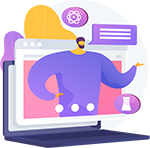ersonalize eLearning Systems: Modern Learning Management Systems can facilitate the Delivery of Personalized Learning Programs. E-Learning often gets a reputation for being impersonal and dull. However, if designed well, eLearning content can be the opposite, with this content providing learners with the chance to learn in a personalized and engaging manner. Modern Learning Management Systems can facilitate the delivery of personalized learning programs. Here are a few of the approaches that can be used to personalize eLearning programs. These approaches help improve the effectiveness of learning:

Personalization Based on Competencies and Skill Gaps
Competency based learning focuses the eLearning curriculum on the knowledge and skill set that is directly related to an individual’s job role. Job role and competency based learning improves the success rate and efficiency of the eLearning programs. An organization can create a competency-skill map for each of its major job roles and link each skill to specific eLearning modules. Each individual is then required or recommended to take a series of eLearning modules based on the skill gaps in order to directly improve their job performance.
Personalized Learning Based on Learner Profiles
When a learner completes their profile within the learning management system, they answer various questions about their location, job-role, business unit, company, etc. By combining profile attributes with learner’s subjects of choice, eLearning modules and learning tracks may be assigned or suggested to personalize the learning plans. The content presented within eLearning modules and learning tracks can be tailored based on learner profile attributes.
Personalization Based on Prior Skill and Knowledge
Determining a learner’s prior skill and knowledge is a great way to create personalized learning tracks to improve their job performance or knowledge in an optimal time frame. Assessments are used to determine the learner’s proficiency in a skill or knowledge area, thereby forming the basis for personalizing the learning tracks, for example what modules within the track to skip. This technique is a great way to differentiate between learners who may have different learning histories. For example, two learners performing the same job may have different gaps in their skill set and knowledge base. Instead of giving both learners the same standardized set of courses or learning tracks, assessing their prior skill and knowledge allows for a concise, personalized learning track that will be more effective in getting them up to speed. When teaching learners based on their prior skill and knowledge, it is important to space out the assignments instead of pushing all the material in a short period of time. Spaced learning gives learners the time to retain the material they have been studying.
Flexible Learning Tracks
Instead of placing learners in fixed and generalized courses, smaller and specific learning modules can be assembled and reused to create personalized learning tracks for a group or individual learners. This ensures that all learners are studying material that is relevant to their job or course of study. Most learning programs are designed by training departments who coordinate the work of subject matter experts and instructional designers to produce eLearning content. However, future online learning programs may also involve knowledge workers (learners and subject matter experts) creating and sharing their learning content from short videos to step-by-step guides and assembling learning track. eLearning programs are most successful when a variety of the approaches discussed in this article are combined to personalized the learning tracks and programs for each learner. There is no reason for businesses to continue with large, monolithic eLearning courses for their employees when the effectiveness of shorter, skill or task-specific eLearning modules and personalized learning tracks is so apparent. Businesses want their employees to learn new skills, improve their knowledge, and excel at job performance. Personalized eLearning systems provide better results in a shorter time frame, while using fewer company resources. For a live demonstration of personalized learning programs, please click here.




